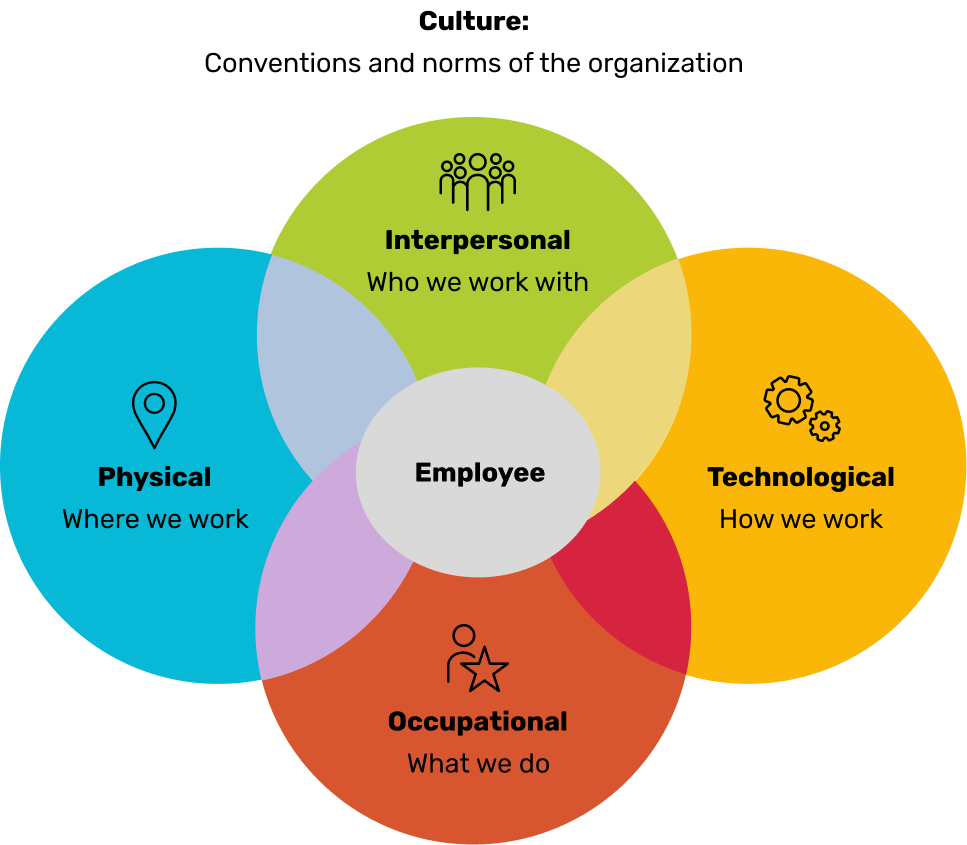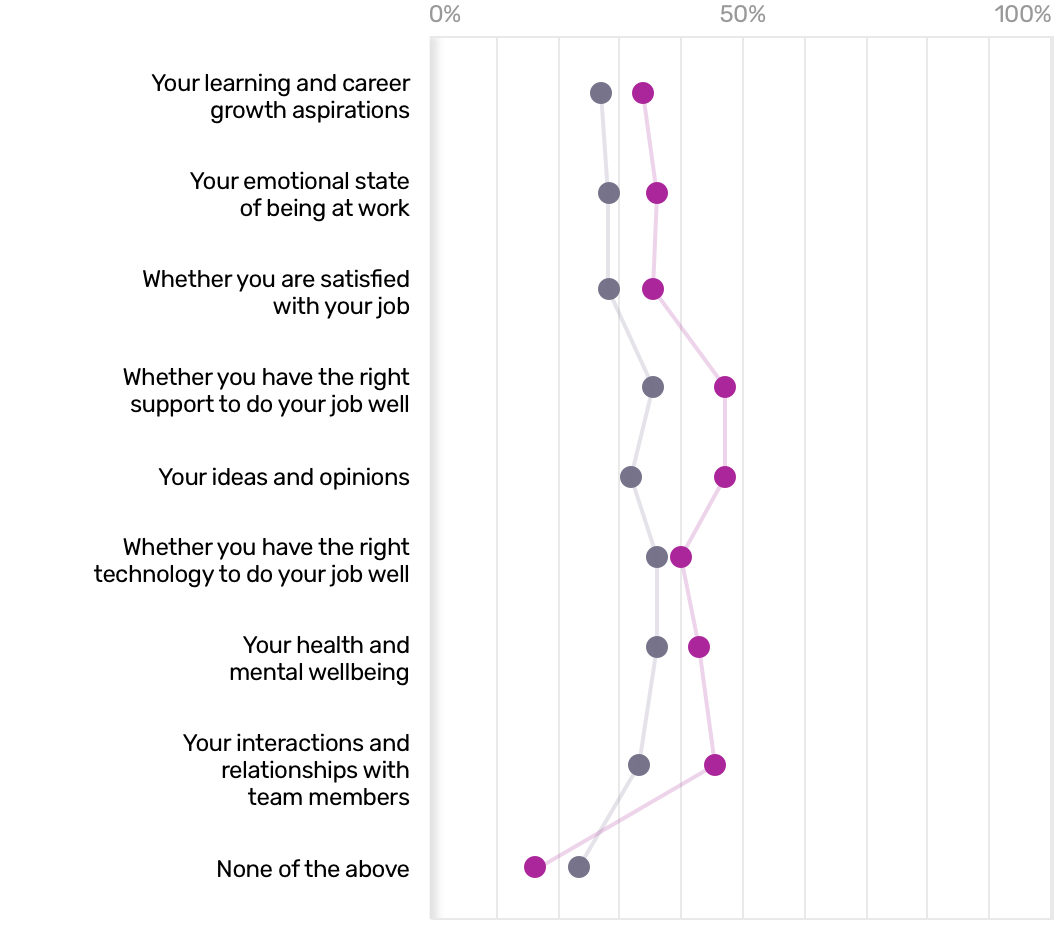Report
The healthcare employee experience through the pandemic
A guide to understanding where healthcare workers are now, and how to get to exceptional employee experiences

Momentous work-life changes amidst COVID-19 pushed employee experience for healthcare workers front and center—but do employers realize it?
How much has the pandemic impacted the employee experience? A lot, according to a recent survey of more than 500 U.S. employees across the healthcare industry by Eagle Hill Consulting.
One out of every three employees who work in the healthcare industry (at health and life sciences companies, payors or provider organizations)—and 39 percent of millennials—say their day-to-day work experience worsened during the pandemic. Despite the stark deterioration and significant numbers of employees considering leaving their employer, only 19 percent said that their organizations took greater action to improve employee experience (EX) over customer experience over the past year.
Why improving the healthcare employee experience matters
Eagle Hill Consulting’s recently published study of the state of the healthcare customer experience revealed how healthcare employee experience drives customer and patient experience. Specifically, a bad employee experience negatively impacts employees’ productivity; ability to serve customers; customer service; delivery of quality outcomes—even their fundamental willingness to help others. In other words, employee experience strikes the bottom line.
Moreover, at a time when more than half of employees (53 percent) report feeling burnt out at work, and jobs reports trumpet the difficulty organizations across industries have been having filling roles—with the healthcare industry experiencing particularly significant challenges with retention and staffing shortages—a top-notch employee experience equates to competitive advantage. As recently noted in Forbes, “Until the coronavirus pandemic completely upended the economy, few workers were in a position where they could demand the benefits they wanted or choose to leave a job that was treating them so badly. Now, there are more people with not only the bargaining power to get what they want, but also the motivation to ask for it.”
Defining the employee experience
Healthcare organizations may struggle to get EX right because they mistake EX with related (but not all-encompassing) concepts, such as engagement, benefits, performance management, and so on. EX is broader; it’s how employees think and feel about their day-to-day interactions within an organization.
Moreover, COVID-19 upended traditional ideas about EX: once employees turned their homes into offices, healthcare organizations gained a host of new challenges related to delivering positive EX outside of their traditional boundaries.
The Eagle Hill model for exceptional EX considers four factors that influence employees, shown in Figure 1: Interpersonal (who we work with), Occupational (what we do), Physical (where we work), and Technological (how we work).
Our report uncovers the employee experience trends healthcare organizations need to address immediately to facilitate an exceptional employee experience.
Figure 1. The Eagle Hill Model for Exceptional Employee Experience

Source: Eagle Hill Consulting
Learn more about our Employee Experience Model
Healthcare Employee Experience Trend #1
Employees want flexibility in where and when they work
Across generations, respondents have mixed sentiments about the return to the physical workplace. Overall, half of healthcare workers in our survey agree that teleworking has been a positive experience.
Where, when, and how employees work in the future remain big questions for healthcare organizations to answer. On the one hand, in-person (in the office) interactions among employees drive innovation, collaboration, camaraderie, and connection to the culture and broader organization. On the other hand, the traditional model restricts employees’ flexibility in their personal lives. That’s a point that can’t be dismissed; as a case in point, a recent workforce survey of more than 2,800 Americans by human resources consulting firm Robert Half found that 23 percent of workers have quit a job because of a bad commute.
Payors and life sciences organizations especially will need to prepare for the possibility of an ongoing hybrid work environment.
Healthcare Employee Experience Trend #2
Employee loyalty is put on edge, indicating serious tension is being placed on the employer-employee trust equation
Our survey reveals that currently, only 41 percent of healthcare respondents say they are very satisfied with their overall work experience. One out of every two healthcare workers (50 percent) surveyed say they have considered leaving their jobs in the past year, and nearly a quarter of respondents (24 percent overall and 28 percent of millennials) said they would leave if offered a comparable position elsewhere with similar pay and benefits (Figure 2).
Employees indicated that they most highly value work-life balance and purposeful work, with 27 percent and 32 percent of respondents respectively ranking these as their most valued factor.
Eagle Hill attributes this trend directly to the pandemic. As they steeped in the personal uncertainties caused by COVID-19, healthcare workers’ anxieties about their work came to a simmer. For example, 21 percent reported they are uncertain whether their jobs could be laid off, furloughed, or salary reduced.
Figure 2. Nearly one in four healthcare workers would leave their current jobs if offered a comparable position elsewhere.
I would stay at my organization even if I were offered a comparable position elsewhere with similar pay and benefits.

Source: Eagle Hill Consulting Healthcare
Employee Experience Survey 2021
The signals of potential turnover that Eagle Hill sees in these results may in fact reflect employees’ own impressions of their employers’ lack of commitment. As healthcare organizations worked through unprecedented challenges of supporting employees both logistically and emotionally during COVID-19, any missteps along the way, and a lack of effort to rebuild the employer-employee trust bond may have had an unusually large impact on their vulnerable and sensitive employees, leaving them primed to make an exit.
Healthcare Employee Experience Trend #3
Millennials in particular are looking for a better employee experience
Our survey reveals that millennial workers in the healthcare industry stand out from all other generations—and not in a good way. The findings underscore that millennials lag behind non-millennials in their overall satisfaction with their work experience, feeling prepared for the future of work, and feeling their managers have their back (see Figure 3).
Compared to non-millennials, millennials in healthcare reported that they are significantly more likely to seek work with a new employer in the next 12 months (38 percent compared to 20 percent of Gen Xers and boomers combined). Millennials were more likely to say their day-to-day work experience has worsened since the start of the pandemic (39 percent) and less likely to say they are very satisfied with their overall work experience than non-millennials (35 percent). When asked about the future of work, millennials more often report a need to be reskilled to adapt to changes in their business/industry (35 percent) and nearly 40 percent feel their organization isn’t investing in retraining and advancing their skills to ready them for the future.
Less than half of millennials say their supervisor/manager demonstrates care and concern about whether they have the right support to do their job well (43 percent) and only a third say their supervisor/manager cares whether they are satisfied with their job (33 percent).
Figure 3. Key areas of dissatisfaction of millennials working in the healthcare industry

Source: Eagle Hill Consulting Healthcare
Employee Experience Survey 2021
These findings show the critical importance of recognizing the uniqueness of different populations within the healthcare workplace, and engaging and addressing the diverse needs, expectations, and requirements of millennials specifically, especially during a time when resignations and job changing are reaching record levels and millennials in healthcare are finding themselves very much in demand.
Healthcare Employee Experience Trend #4
Healthcare workers want organizations to be more inclusive and feel let down by not having a sense of belongingness
How employees think or feel about their day-to-day work interactions defines their experience; therefore, organizations must demonstrate recognition that how their employees feel has real consequence. Yet our survey shows that too few healthcare organizations have taken this crucial step.
For example, more than one out of two (51 percent) respondents disagree that they are being mentored for success. As they flounder toward an uncertain future, healthcare workers have sought a helping hand—that isn’t there. In fact, less than half (47 percent) of respondents say their supervisor/manager demonstrates care about whether they have the right support to do their job well and only two in five (40 percent) say their supervisor/manager demonstrates care about whether they have the right technology to do their job well.
Across industries, Eagle Hill looked at eight areas for emotional support that are critical to providing an excellent employee experience. For not one factor did a majority of respondents agree that their supervisors/managers or their organizations demonstrate care or concern (Figure 4).
Employee attitudes may herald an even larger problem. According to the 2021 State of the Manager report from Glint and LinkedIn, manager burnout rose 78 percent between Q1 and Q4 of 2020. Findings such as these indicate that supervisor/managers themselves feel stretched beyond their limits today, likely with little left over for employee care.
Figure 4. Healthcare workers appear unimpressed with the level of care and concern their supervisors/managers and organizations demonstrate.
Does your supervisor/manager and your organization demonstrate care and concern about the following?

Source: Eagle Hill Consulting Healthcare
Employee Experience Survey 2021
Healthcare Employee Experience Trend #5
Employees want more help from employers to adapt and get ready for a rapidly changing future
Compounding the sense of uncertainty employees feel, the nature of work in healthcare has faced drastic change. According to the Forrester Research article, Predictions 2021: “COVID Wrote The Business Case — Our Future Is Digital,” “the pandemic changed everything… [in 2019], 85 percent of firms viewed digital as nice to have. In 2020, every company learned that digital is critical to customer and business success.”
Many healthcare workers don’t feel ready for the digital future. When asked if their organizations were training them with what they need for the future, 35 percent of healthcare respondents in our survey said they are not confident that they are getting the right skills training for the future. In fact, a significant number believe they need more drastic intervention than simply some added training: more than a quarter (26 percent) say they feel the need to be reskilled. Interestingly, male respondents were considerably more likely (32 percent) than females (25 percent) to say they need to be reskilled. And young millennials, despite their advantage in having been raised in a digital society, were more than twice as likely as boomers (35 percent versus 15 percent) to feel they needed to be reskilled.
Figure 5. Healthcare workers’ perceptions of their future opportunities reflect the uncertainties of current and recent past.
How would you rate your overall experience with the following HR programs?

Source: Eagle Hill Consulting Healthcare
Employee Experience Survey 2021
Following on to our first healthcare employee experience trend, healthcare workers clearly worry about their place in the future. Against the backdrop of dramatic political and civic upheaval and rapid technology advances, employees have learned that past career results are no guarantee of future performance. In fact, nearly a third (32 percent) of all respondents have a negative impression of their promotion opportunities and slightly over a quarter (27 percent) have a negative impression of their career path opportunities (Figure 5).
With competition coming from all corners, even employees who historically have had a comfortably defined path forward feel threatened. Healthcare organizations must take a more active and vocal role defining how their employees figure into their future—or risk their valuable employees taking an exit.
The gap in employee experience efforts today
As our findings show, what healthcare workers expect of their employers and of their experience has rapidly shifted given COVID-19, social change, new technologies and more—and those changes are only going to continue.
Yet, the results of our survey indicate that healthcare organizations may have only a rudimentary grasp of the challenges employees face. How can healthcare organizations close the gap and get EX right, at a time when that matters the most?
Read our full report to get in-depth recommendations on how to create the employee experiences healthcare workers have been looking for.
Methodology
The Eagle Hill Consulting Healthcare Employee Experience Survey 2021 was conducted online by IPSOS in January 2021. The online survey included 509 respondents from healthcare workers across the United States. The survey polled respondents on aspects of their employee experience.

